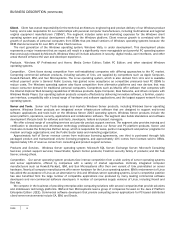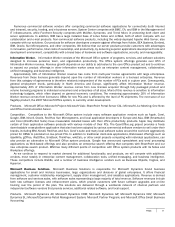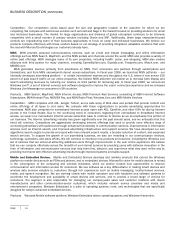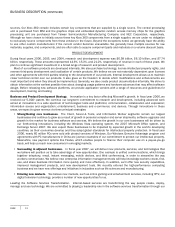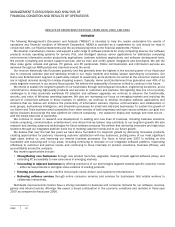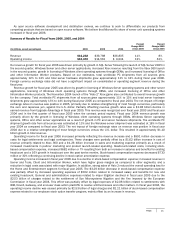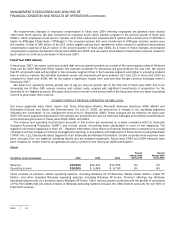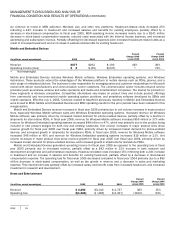Microsoft 2006 Annual Report Download - page 19
Download and view the complete annual report
Please find page 19 of the 2006 Microsoft annual report below. You can navigate through the pages in the report by either clicking on the pages listed below, or by using the keyword search tool below to find specific information within the annual report.
PAGE 18
BUSINESS DESCRIPTION (CONTINUED)
Declines in demand for software could occur. If overall market demand for PCs, servers, and other computing devices
declines significantly, or consumer or corporate spending for such products declines, our revenue will be adversely affected. In
addition, our revenue would be unfavorably impacted if customers reduce their purchases of new software products or
upgrades to existing products because new product offerings are not perceived as providing significant new functionality or
other value to prospective purchasers. We are making significant investments in Windows Vista and the 2007 Microsoft Office
system. If these products are not perceived as offering significant new functionality or value to prospective purchasers, our
revenue and operating margins could be adversely affected.
We have claims and lawsuits against us that may result in adverse outcomes. We are subject to a variety of claims and
lawsuits. Adverse outcomes in some or all of the claims pending against us may result in significant monetary damages or
injunctive relief against us that could adversely affect our ability to conduct our business. While management currently believes
that resolving all of these matters, individually or in the aggregate, will not have a material adverse impact on our financial
position or results of operations, the litigation and other claims are subject to inherent uncertainties and management’s view of
these matters may change in the future. There exists the possibility of a material adverse impact on our financial position and
the results of operations for the period in which the effect of an unfavorable final outcome becomes probable and reasonably
estimable.
We may have additional tax liabilities. We are subject to income taxes in both the United States and numerous foreign
jurisdictions. Significant judgment is required in determining our worldwide provision for income taxes. In the ordinary course of
our business, there are many transactions and calculations where the ultimate tax determination is uncertain. We are regularly
under audit by tax authorities. Although we believe our tax estimates are reasonable, the final determination of tax audits and
any related litigation could be materially different from our historical income tax provisions and accruals. Based on the results of
an audit or litigation, a material effect on our income tax provision, net income or cash flows in the period or periods for which
that determination is made could result.
We may be at risk of having insufficient supplies of certain Xbox 360 components or console inventory. Some components
of the Xbox 360 are obtained from a single supplier and others may be subject to an industry-wide supply shortage. If a
component delivery from a sole-source supplier is delayed or becomes unavailable or industry shortages occur, we may be
unable to obtain replacement supplies on a timely basis, resulting in reduced console and game sales. Components are ordered
based on forecasted console demand so we may experience component shortages for the Xbox 360 or, alternatively, excess
console inventory that may require us to record charges to cost of revenue. Xbox 360 consoles will be assembled in Asia;
disruptions in the supply chain may result in console shortages that would affect our revenues and operating margins.
If our goodwill or amortizable intangible assets become impaired we may be required to record a significant charge to
earnings. Under generally accepted accounting principles, we review our amortizable intangible assets for impairment when
events or changes in circumstances indicate the carrying value may not be recoverable. Goodwill is required to be tested for
impairment at least annually. Factors that may be considered a change in circumstances indicating that the carrying value of
our goodwill or amortizable intangible assets may not be recoverable include a decline in stock price and market capitalization,
reduced future cash flow estimates, and slower growth rates in our industry. We may be required to record a significant charge
to earnings in our financial statements during the period in which any impairment of our goodwill or amortizable intangible
assets is determined, negatively impacting our results of operations.
Changes in accounting may affect our reported earnings and operating income. Generally accepted accounting principles
and accompanying accounting pronouncements, implementation guidelines, and interpretations for many aspects of our
business, such as revenue recognition for software, accounting for investments, and treatment of goodwill or amortizable
intangible assets, are highly complex and involve subjective judgments. Changes in these rules or their interpretation or
changes in our products or business could significantly change our reported earnings and operating income and could add
significant volatility to those measures, without a comparable underlying change in cash flow from operations. See Note 1 in
Notes to Financial Statements and Management’s Discussion and Analysis of Financial Condition and Results of Operations –
Application of Critical Accounting Policies of this report.
We operate a global business that exposes us to additional risks. We operate in over 100 countries and a significant part of
our revenue comes from international sales. Pressure to make our pricing structure uniform might require that we reduce the


